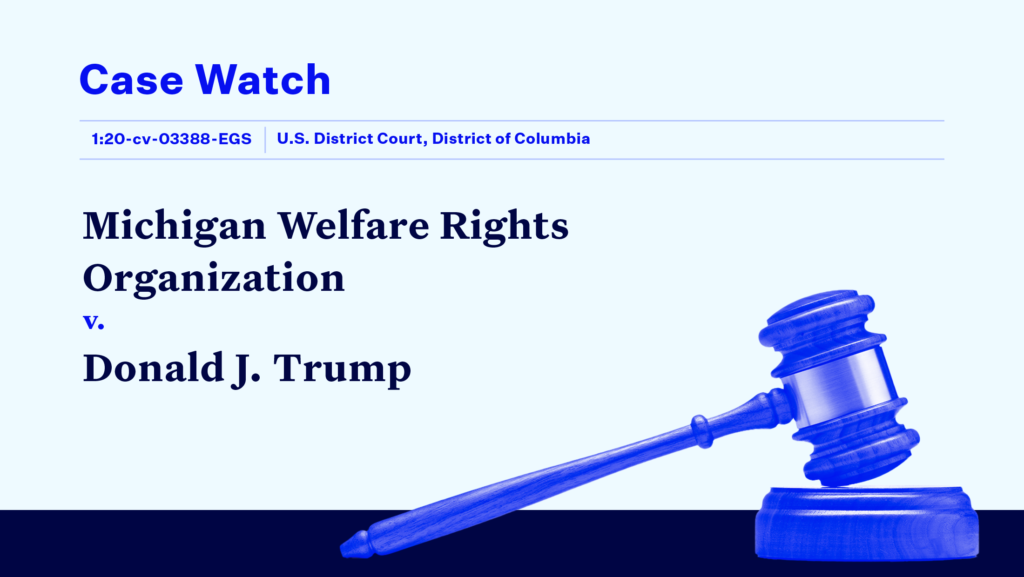Trump’s Big Lie and the Violation of the VRA and KKK Act

Investigations into former President Donald Trump’s “Big Lie” and its impact on the November election did not end with the impeachment trial in February. The NAACP brought a lawsuit against Trump, his campaign and the Republican National Committee (RNC) for their efforts to disenfranchise Black voters in 2020. The case is currently in front of a federal judge in Washington, D.C.
How did we get here?
In late November, just a few weeks after the presidential election, the NAACP Legal Defense & Educational Fund filed a lawsuit against Trump and his campaign on behalf of the Michigan Welfare Rights Organization and three Black Michigan voters. The lawsuit, brought in the U.S. District Court for the District of Columbia, accused Trump of violating the Voting Rights Act (VRA) by pressuring state and local officials in Michigan to not certify election results.
The complaint focused on Trump’s attacks on Detroit, where he baselessly called the election a “giant scam” and tweeted “Voter Fraud in Detroit is rampant, and has been for many years!” The NAACP LDF called out Trump’s tactics as an obvious effort to disenfranchise Black voters. The complaint outlined the November controversy over election certification of Wayne County, where Republican members of the canvassing board had initially refused to certify the election. While the Republican members later reversed course and certified Wayne County’s results, Trump did not relent. He personally called both canvassers in a last-ditch effort to disenfranchise Black voters in Detroit.
The NAACP LDF argued that these actions by Trump and his campaign violated Section 11(b) of the VRA, which provides that “No person, whether acting under color of law or otherwise, shall intimidate, threaten, or coerce, or attempt to intimidate, threaten, or coerce any person for voting or attempting to vote, or intimidate, threaten, or coerce, or attempt to intimidate, threaten, or coerce any person for urging or aiding any person to vote or attempt to vote.”
After the election results were certified, the NAACP LDF filed an amended complaint, this time adding the NAACP as a plaintiff and the RNC as an additional defendant. The amended complaint also included an additional statute violation on top of the VRA: the Ku Klux Klan Act. The Ku Klux Klan Act prohibits people from conspiring to deny “any person or class of persons of the equal protection of the laws.”
The amended complaint connected Trump’s involvement in the Wayne County certification to a larger voter suppression effort, writing:
Under the specter of preventing ‘fraud,’ Defendants engaged in a conspiracy, executed through a coordinated effort, to disenfranchise voters by disrupting vote counting efforts, lodging groundless challenges during recounts, and attempting to block certification of election results through intimidation and coercion of election officials and volunteers. These systematic efforts – violations of the VRA and the Ku Klux Klan Act – have largely been directed at major metropolitan areas with large Black voter populations.
The NAACP’s amended complaint also sought additional relief, asking the judge to rule that the defendants must secure approval from the court before engaging in any post-election activities, refrain from intimidating election officials and voters and train volunteers on the VRA.
Trump and the RNC’s responses have been predictably unapologetic. They have dragged out the process by asking for extended time to respond to the amended complaint, filed a motion to transfer the case to a different court and filed a motion to dismiss.
Most recently, the court gave plaintiffs until April 7, 2021 to file their opposition to the motion to dismiss. The judge will likely not rule on the motion to dismiss until after the defendants file their own reply to plaintiffs’ opposition brief.
What’s at stake?
Despite Trump and the RNC’s loss in November, much of the damage they inflicted on our democratic system has gone unpunished. Trump and his allies filed over 60 meritless lawsuits challenging the results of the election, and never received a judicial sanction. His attorneys continue to practice law and his Republican colleagues still hold political office, continuing to spread lies of election fraud from their podiums. Trump’s Republican allies in the U.S. Senate ensured that he was acquitted during his second impeachment trial, leaving the door open for another dangerous run in 2024.
Michigan Welfare Rights Organization v. Trump is one of the few still-active cases that stands up to Trump and the RNC. They must be held accountable for their violations of the VRA and the Ku Klux Klan Act to protect our democracy at large and to specifically protect the rights of Black voters who once again are being targeted by the latest voter suppression bills on the floors of state legislatures across the country.
Ultimately, this case stands to answer important questions about how political actors may seek to interfere with our elections in the future: Will the RNC continue to ruthlessly suppress minority votes with no consequences? Or will the courts utilize the VRA for its original intended purpose and ensure that all voters can cast their ballots and have them counted without having to contend with these unrelenting attacks on the system and their right to vote? The courts must hear this case and enforce the equal protection of our fundamental right to vote.